
Nancy Huntting, Aesthetic Realism consultant, writes:
The landmark 2000th issue of this journal answers two of the largest human questions: What in us stops us from being happy? And—Why is poetry essential to everyone’s life? Read “About Poetry & Our Own Happiness,” the great new issue of The Right of Aesthetic Realism to Be Known.
The commentary by Ellen Reiss begins:
Dear Unknown Friends:
We are serializing Eli Siegel’s great 1972 lecture We Approach Poetry Variously. And here too is part of a paper presented by Leila Rosen at an Aesthetic Realism public seminar last month. The subject of the seminar was happiness—and what in ourselves stops us from having it. Ms. Rosen is a teacher of English and literature.
I have said there is nothing I love more, nothing I see as greater, kinder, more beautiful, more needed by the minds of people, than the Aesthetic Realism explanation of poetry. It is Eli Siegel’s explanation, and he came to it through the widest, richest, most careful scholarship, looking, testing. Poetry, he wrote, “is the oneness of the permanent opposites in reality as seen by an individual.”
That principle is central in the lecture we’re serializing. When a person sees with a certain fullness of justice the matter he or she is writing of, the world’s opposites are present as one in what is seen and written. A result is what Eli Siegel showed to be the crucial thing in poetry: poetic music. We hear—and in each poem differently, each line differently—the oneness of such opposites as motion and rest, tumult and calm, expansion and contraction, clarity and nuance, what’s ordinary and what’s strange.
Poetry & Our Happiness
In this issue, as Ms. Rosen’s paper about happiness meets what Mr. Siegel is explaining, we have a vivid reason why it’s necessary to see what poetry is. We will not have the happiness we want unless we see that poetry stands for it.
For example, looking at the poetry collection Sound and Sense, Mr. Siegel explains that what we want from any experience of ours is to be simultaneously pleased and made stronger; to have pleasure that’s inseparable from knowing. If these qualities are not one in us, we will not be happy. That is a fundamental reason happiness has been such an elusive thing for people….” Read more